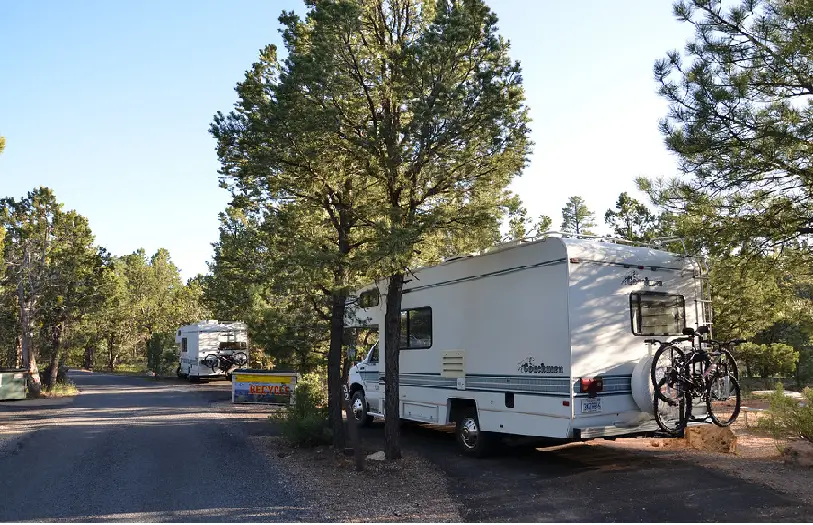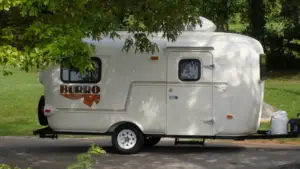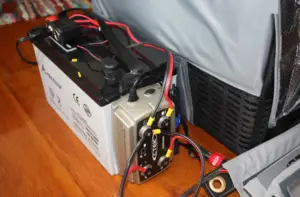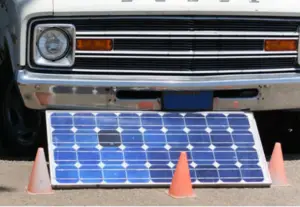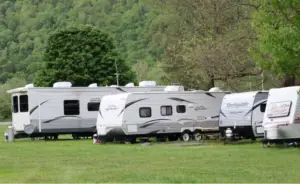Every RV Park has a set of rules either within the pages of the park’s brochure or posted on a sign.
Generally, these guidelines include RV occupancy details, check-in/check-out procedures, speed limit rules, neighbor etiquette, and the use of RV park amenities.
Frequently, you will find some somewhat surprising and unusual rules that can catch you off guard.
Here is an exclusive look at the common RV park restrictions. Let’s dive in!
Common RV Park Restrictions
Most RVers are conversant with RV park rules. RV park restrictions and rules are created to ensure the satisfaction and safety of all RVers as they enjoy all the establishments it has to offer.
Some of the park rules that might surprise you, although many RV parks have them in place, include;
Particular dog breeds not allowed
Dog breeds restrictions are common among RV parks. Although an RV park allows dogs, it might not allow your dog. Usually, the large dog breeds linked with aggressive behavior are the ones restricted in most RV parks.
These might include; pit bulls, boxers, and mutts.
Some parks also restrict dogs based on weight. Don’t get too mad at RV parks for this rule because it might be because of the parks insurance policy.
Many RV parks require all pets to be registered at the office with a maximum of two pets per RV site, with pets not allowed on grass areas or at food functions.
RV Length restrictions
RV’s, may it be motorhome or towable travel trailer are generally lengthy. Campgrounds, RV parks do have length restrictions and you cant simply drive in their with your 45 feet long motorhome.
Campgrounds specify their length restrictions and have separate limits for travel trailers and motorhomes.
National parks also have length restriction and you have to obey as per their regulations.
There is no specific length that is followed by all campgrounds and they have their own limits. Mostly, for both towable and motorhomes; length limits are same but in some cases trailers are limited to lesser lengths.
The length limits can be as less as 15 feet to as lengthy as 50 feet and even longer in case of motorhomes with trailers behind them. Check here some examples of RV parks and their length limits.
You will also find some campgrounds with no length limits.
Just to give an idea, here are different campground and RV parks in different national with their length limits.
| Campground | RV Length Limit | National Park |
|---|---|---|
| Black Rock Campground | 35 feet | Joshua Tree |
| Deep Creek | 26 feet | Great Smoky Mountains |
| Railway Campground | 47 feet | Grand Canyon |
| Seawall Campground | 35 feet | Acadia National Park |
| Furnace Creek Campground | 40 feet | Death Valley |
| Lodgepole camground | 42 feet | Sequoia National Park |
| Yosemite National Park campgrounds | 40′ Motorhomes and 35′ Trailers | Yosemite |
| Grant Village campground | 40 feet | Yellowstone |
| Lava Point | 19 feet | Zion |
Looking at these various examples of length limit across RV parks in national parks a best ideal length for your RV will be around 35 feet.
Having a longer than 35 feet RV will limit your options in national parks and many campgrounds will not be welcoming to you.
Similar to length restrictions, campgrounds also have height limitations which is generally around 14 feet.
Older than 10 years RVs not be allowed
You might be surprised to find out older RVs might not be allowed in the park.
Quite a significant number of RV parks have put in place the 10 years rule, which allows the park to turn away any RV unit older than ten years.
RV parks feel old RVs pose a safety hazard while others restrict older than 10 year RVs for aesthetic purposes.
They want their resort to have an excellent aesthetic look. Even so, this restriction affects a lot of campers. You should hence always verify if the rule is in place before completing your reservation.
No external RV leaks
Are you yet to fix the leaking sewer or water heater? This could make you get kicked out of an RV park. Sure enough, nobody will want to camp close nearby an RV with a leaking sewer.
It is hence common for the park management to tell you to vacate the park because of any external water leakage. Ensure your RV is in total working order before hitting the road and camp in an RV park.
No glass containers outside your RV
There is nothing better after a tiring adventure than sitting outside your RV and drinking a cold drink straight from the whisky bottle.
Just ensure it is not a glass container. Most of the RV parks do not allow glass containers outside of RVs. This will mean
No ATVs or even No Motorcycles
Are you thinking of bringing a toy with you? Make sure it is allowed before booking your RV campsite.
- Most RV parks do not allow you to keep a motorcycle or ATV on site. However, you can get around it by purchasing a toy hauler fifth wheel. Traveling with a toy hauler is similar to having your personal garage.
No one requires to know what toys you are carrying around.
No outdoor firewood
Camping at an RV park requires you to follow the put in place restrictions that ensure all campers’ safety and protect the surrounding environment’s livelihood.
Coming with firewood on the park comes with a risk of bringing a tree-damaging disease or insect. The insects might crawl out and spread to the park trees and begin to cause destruction.
This is one of how the Emerald Ash Borer got around and has been damaging ash trees across the country. In case of these restrictions, RV parks sell firewood indigenous to the region.
Extra individuals mean spending extra dollars
Some RV park restrictions and rules specify the number of occupants for inclusion in the RV camping. Any extra person will be paying additional charges.
RV parks might also charge visitors to the park for the day or during operating hours to use the park facilities like the pool. Extra campers produce extra expenses when using facilities and supplies.
Also, you should notify the RV camp office if you are expecting any guests before arrival so they will be allowed to get in, while visitors must always be in the company of registered guests.
Additional electric fee to RV Park Rate
In most cases, short-term RV campers do not have to worry about the additional electric fees. There are monthly reservations that can have this extra fee.
Monthly RV park rates are mostly deeply discounted as compared to nightly rates. Often, the monthly rate does not include electric usage.
These additional electric fees may cost between $50 to $200 extra per month. Before booking your RV park reservation, it is essential to inquire about the park’s electric billing policy.
No excessive decor at the RV Park
You might find this funny, but many RV parks have policies against excessive décor. A trashy site is not appealing.
Nevertheless, such judgment call rules can be applied unevenly, mainly if politics are involved. The point is, don’t carry excessive décor to the RV camp. Also, do not travel with the pink toys and flamingos, either!
Portable pet fences are not allowed
RVers can sometimes erect a movable enclosure at their site while attempting to let their pet to stray unrestricted off-leash.
Some of the RV parks do not have an issue with a portable fence at their site as long as the owner is outside with the pet and maintains a watchful eye.
However, other parks restrict this notion mainly if previous RVers have used it irresponsibly, such as setting up the fencing unit only to leave the dog unattended.
The dog might break free from the confined space and go away without the knowledge of the owner. Pets must always be kept on a leash with the owner when outdoors. You cannot tie your pet outside and leave it unattended.
No washing your RV in the park
As convenient as it can be to wash and rinse off the RV while camping at a park, this practice is seen as a violation at various parks.
Washing an RV on-site means using a massive amount of water, leaving the area messy and muddy, or even splashing to the neighboring units.
Alternatively, some parks might pose additional water fees instead of completing restricting campers from washing their RVs. They might also apply a secondary option of using a mobile cleaning service.
The company will come to the park, and clean the RV at your own expense with their cleaners and tools, including a portable water source.
General Rules and regulations
It is always best to read through complete rules and regulations of the campground or RV park you will visit. Each campground will have their unique set of rules to follow. Even then there are many rules that you will find to be similar at many RV parks.
- Let me list the most common rules RV parks follow:
- No repairs or maintenance of RV at the campground site
- Speed limit of 5 to 10 MPH inside the park.
- No drying of cloths , laundry outside the RV
- No open storage under the RV
- Pets shouldn’t be left unattended
- No overnight guests allowed and each guest should be registered with office.
- Cannot change the RV parking slot once it is assigned. You should consult the staff if you want a change.
- Should not use loud appliances like generator
- Some campgrounds completely ban generators so that others are not disturbed.
- Smoking should be done at designated locations only.
- Some will ban alcohol completely as well.
- Certain campgrounds will not allow campfires
These are just some examples and some campgrounds will not necessarily have these restrictions. It all depends on campground and how they carry out their operations.
Is It Worth It To Camp At RV Park?
RV camping is rising in popularity for various reasons. But is it worth it to camp at RV Park?
Absolutely yes!
One of the most significant advantages of camping at RV Park instead of a campground is easy accessibility to facilities for you and your entire household.
An RV park offers ready entry to social actions, entertainment, and events. Direct access to facilities such as power, water hookups, sewer, local restaurants, WI-FI access, and shopping offers you a particular level of luxury that a campground cannot provide.
You will be able to spend time at an RV park, enjoying all the great outdoors with all home comforts.
Internet and WiFi
Having internet while you camp and travel in RV has become a very important necessity. So, while you camp at an RV park, will you get that home like WiFi internet connection?
Most RV parks provide Wi-Fi and the internet usage can be free or may cost at discounted rate. A lot depends on the location of the campground as well. Remote located locations may be using satellite internet or DSl with slow speed.
Also, do not expect the internet to be very high speed. WIFI signals could be weak based on how big the park is.
Long Term Stays
Based on how popular a RV park is you may need to book the spot months in advance. One can stay at a RV park for long term however some will have restrictions on how long you can stay. Boondocking sites around united states have 14 days limitations but a paid RV park will not have such a short duration restriction.
People often live for months and most RV parks have discounted monthly rates. Though they may or may not mention those rates, you should always ask and I bet they will have discounts on long duration stays.
Background checks
Many RV parks do background checks on their guests before providing the slot. This is mostly done to protect themselves as someone may default on their payments and they may have to approach court.
They will however not run credit check on their customers.
Pop up campers
RV parks or campgrounds generally do not allow sleeping or camping in vehicles other than RV’s. Some also have restriction on what type of RV it is. Certain campgrounds do not allow travel trailer or other towable RVs as well. They may also have restrictions specific to pop up campers or other canvas based campers .
Most RV parks do not have any restrictions on pop up campers. However, some may have restrictions either due to bear activities or due to length restrictions.
Mails
Many RV parks accept mails for their guests however you need to check this with the park staff as not all park accept mails. Many RVers who live full time and travel need mail services.
If you plan to live at an RV park for months then its better to have this facility at the park. Before making the reservation check with them and ask about all your doubts.
Where can you find RV camp for free?
The best things in life are free. After all, who doesn’t like free things?
When it comes to RV camping, you can find thousands of free campsites across the US that don’t charge a dime.
There are tons of different places where you are legally entitled to camp overnight, weekly, or even a month. Either way, free camping, also known as boondocking, takes many forms, or you can find a style that fits you best.
It is an effective way of saving money and spending more time camping, and having ultimate fun.
Some of the places you can find RV camp for free include below.
Public Land Camping
The best areas for RV camping are public areas. These include; national forests, BLM areas, and more.
Most of these public areas are generally open to both RV campers and tents. If you are traveling by bike or looking for free campgrounds for a tent, public land is probably the best place to camp.
They often have better views and more fun. Some, like National Parks, primarily provide paid camping, while others have 14 days of free RV camping. Bureau of Land Management (BLM)
BLM is found chiefly out west, and dispersed camping is permitted on most BLM land for about 14 days.
The exceptions apply in areas close to population centers and grazing areas. You can browse your regional maps to identify the location of free BLM camping or contact the local BLM office to get more information on where you can camp for free.
Forest Service Land (USFS)
Dispersed camping is also allowed in more than 175 national forests as well as grasslands in the US. For more camping information on the free available USFS locations across the country, you need to directly check out with the ranger district.
Parking Lot Camping
This is a good option for those looking for a quick overnight stop in an RV. This includes parking at a truck stop, a Walmart, hotel/motel, trailheads, visitor centers, rest areas, etc.
However, you should always ensure that you have permission when parking in a store parking lot. Just call the store and ask to speak to the store manager. You can also go to the store and purchase something as a thank you.
When staying in these types of parking lots, you have to stay inside for the evening. This means cooking, sleeping, and hanging out in the RV, but it is a good option if you are in a bind.
Ensure to confirm with the management for any questions or anything you are not sure about because not all parking lots allow overnight parking.
Walmart
As stated earlier, Walmart often allows free overnight in their parking lot. However, this is not always the case as some Walmart prohibit overnight parking; hence you should ensure to call or go inside and ask.
As a common rule, always obey any signs you may see. Other countrywide chains that permit overnight parking include; Cracker Barrel and Cabela.
Truck stops, casinos, and rest stops- these are also private places that offer free overnight parking.
Usually, their parking lots are well lit for excellent safety, while some will have a specific area for shower facilities and big rigs. Some of these facilities can be noisy depending on their proximity to the road and getting in and out of big rigs.
However, if you urgently need a convenient place to camp overnight, these are great options for you.
Free Camping At Wineries
You might be able to camp at wineries for free when traveling with an RV. Harvests Hosts is a membership camping program that goes for about $44 per year and enables you to camp free for one night at the various wineries across the US. But you will also require to have a self-contained RV with a bathroom.
Summary
RV camping is absolutely fun. However, it is essential to keep these restrictions in mind to ensure you are good to camp in an RV park.
It is always a perfect idea to call the RV Park before finalizing your travel plans. Make inquiries, ask questions, and clarify any misinformation about any RV park rules you are concerned about. And with so many free campsites in the US, you should give boondocking a try. Happy camping!

